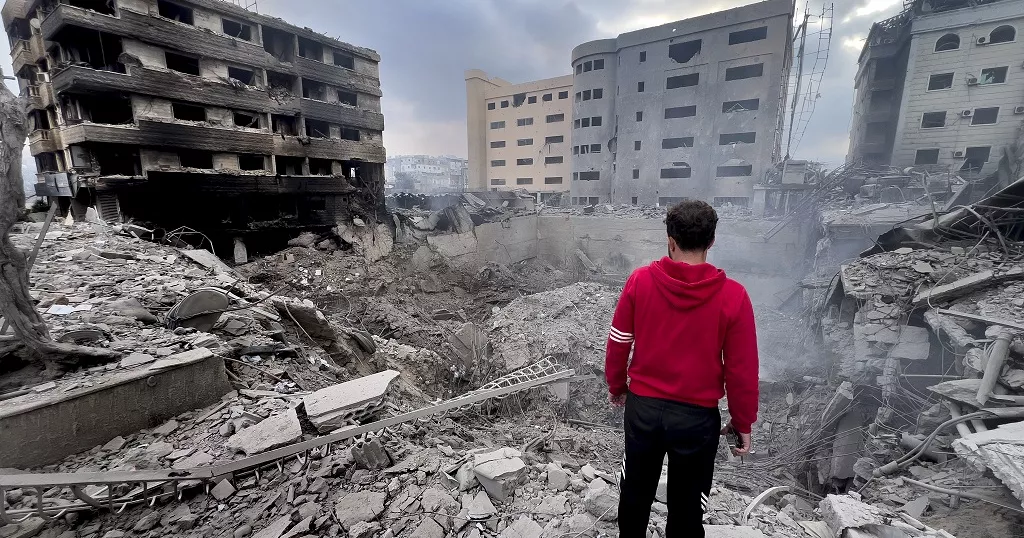Stranded African Migrant Workers in Lebanon Amid Ongoing Conflict
3 min read
A man looks at destroyed buildings hit by Israeli airstrikes in Dahiyeh, Beirut, Lebanon, Monday, Oct. 7, 2024

A man looks at destroyed buildings hit by Israeli airstrikes in Dahiyeh, Beirut, Lebanon, Monday, Oct. 7, 2024
As the conflict in Lebanon escalates, a group of Lebanese activists has stepped up to support African migrants caught in the turmoil. These activists are working tirelessly to advocate for the release of workers trapped under the Kafala labor system, which permits employers and agents to withhold passports, effectively imprisoning migrants in their jobs and preventing them from leaving the country.
While many nations are airlifting their citizens to safety, migrants from various African countries have found themselves abandoned in the streets of Lebanon. With the situation worsening, these individuals are in dire need of food, shelter, and protection. The Lebanese government has reported that over 1.2 million people have been displaced due to Israeli bombardments, significantly straining available resources.
Given the limited capacity to shelter its own citizens, the government has prioritized local needs, leaving tens of thousands of migrants without basic support. Amid this chaos, a group of 80 women from Sierra Leone has managed to find refuge, albeit in precarious conditions.
Mary Koroma, a 28-year-old Sierra Leonean migrant, shared her harrowing experience. “I came here to work to take care of my family,” she said. “But since this war started, I don’t have a job. I was working in Kounine village, but with all the bombings, I was too afraid. I moved to Beirut, but even here, the bombings have followed.” Koroma, who left her husband and two children behind, used to send her monthly salary of $200 back home. Now, her future is uncertain.
Another migrant, Hassanatu Conteh, is facing even greater challenges. She suffered a car accident just before the conflict intensified, severely limiting her mobility. “I feel scared because of the war and my condition,” she said. “I cannot work for myself. I don’t plan to stay because now I am scared of Lebanon.”
Unfortunately, many of the African migrants in the shelter have no financial means for evacuation, and most do not possess their passports. The Kafala system, an Arabic term meaning “sponsorship,” binds migrant workers to their employers, preventing them from seeking other employment or leaving the country. Employers typically retain their workers’ passports, leaving them vulnerable and at the mercy of often abusive situations.
Dia Haj Shahin, a Lebanese activist, described the Kafala system as a form of “modern-day slavery.” “It grants no rights to migrants, treating them as second-class humans,” she explained. “They often face abuse, lack basic rights, and many do not receive pay for their hard work. It’s all considered acceptable under Kafala. Some women tell me their employers’ homes have been bombed, and they have no idea where their passports are.”
Fortunately, activists like Shahin are advocating for these women. They are collaborating with local authorities to recover passports and facilitate the repatriation process. “We have collected information from everyone under our care to start the repatriation process with immigration and general security,” Shahin noted. However, the challenge remains that many do not even have pictures or contacts for their employers, complicating efforts for their safe return.
While some women have found a semblance of support, the plight of many others remains dire. The United Nations reported that numerous Lebanese families who fled the country have left their domestic workers locked inside their homes. The International Organization for Migration (IOM) has indicated a troubling increase in cases of abandoned migrant workers, estimating that approximately 170,000 migrants currently reside in Lebanon.
As the conflict continues, the vulnerability of migrant workers highlights a significant humanitarian crisis. Without urgent assistance and a reevaluation of the Kafala system, countless individuals will remain trapped in a cycle of exploitation and fear. The efforts of activists are crucial in providing some relief, but the situation underscores the need for systemic change and international support for migrant workers in Lebanon and beyond.